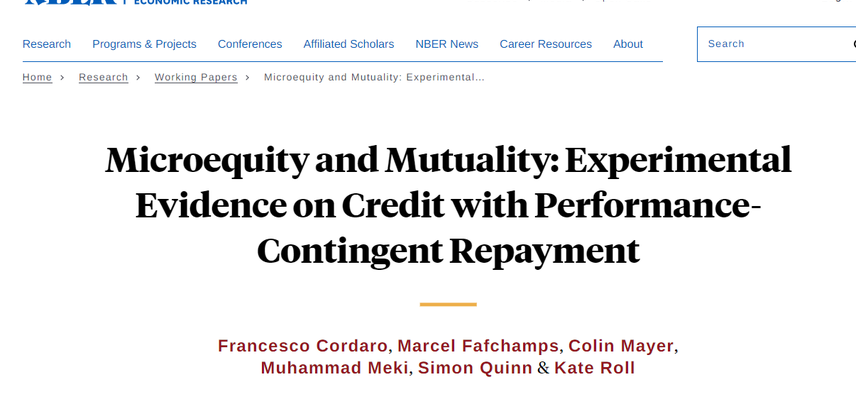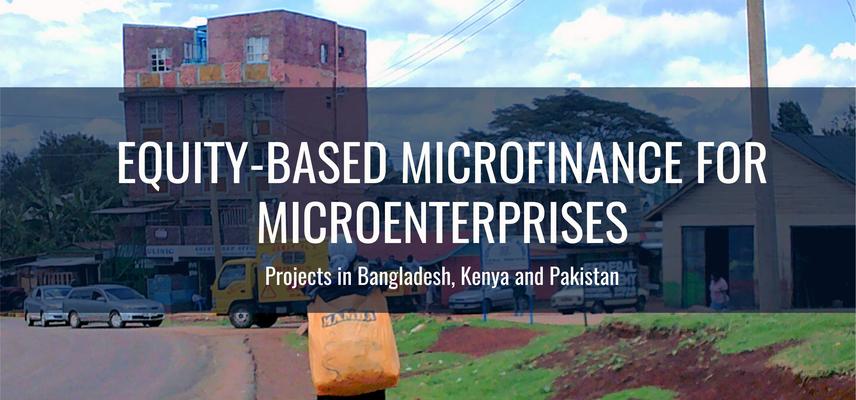MICROEQUITY FOR MICRO-DISTRIBUTORS IN KENYA
OUR AIMS
Technological change is rapidly blurring the traditional boundaries of firms by enabling new ways for organisations to manage workers. Many large companies rely increasingly on workers who are managed as independent contractors rather than employees – many of whom, in turn, work exclusively with that single large company. This project investigates one such opportunity that leverages recent developments in financial technology and interlinked contracting. The intervention is implemented within a large multinational supply chain and its purpose is the financing of productive assets for the poor.
In this project, researchers run the first field experiment of a performance-contingent microfinance contract. The team investigate the impact of a productive asset (a bicycle) on micro-distributors, and explore the impact of different contractual structures for repayment, with a specific focus on asking whether more ‘equity-like’ contracts (with performance-contingent repayments) can be more successful than a standard debt contract in improving business outcomes for micro-distributors.
ABOUT THE PROJECT
The research team work within the supply chain of a large multinational corporation. The experiment tests the efficacy of several alternative contracts designed to allow self-employed micro-distributors to purchase lumpy fixed assets (such as a bicycle). In particular, researchers test the consequences of linking asset repayments to client performance, through a contingent-repayment model. The team’s collaborating partner is one of the largest manufacturers of food products in the world, and owns a large chewing gum producer in Kenya. This corporation is referred to pseudonymously as ‘FoodCo’. Like UberEats, Deliveroo, GoJek and many other companies around the world, ‘FoodCo’ relies in Kenya on a network of ‘micro-distributors’: self-employed individuals who provide ‘route-to-market’ services, moving product from a stock-point to customers. Specifically, ‘FoodCo’ uses two kinds of micro-distributor:
- individuals who move confectionery products from stock-points to retailers;
- and individuals who move products from stock-points for direct sale to consumers.
Both forms of micro-distributor need to transport stock – and, traditionally, most do so without the help of a vehicle.
In this experiment, researchers partner with a local microfinance institution in order to provide new bicycles for micro-distributors. The purpose is to understand whether it is profitable for large corporations to finance the acquisition of productive assets by gig-type workers through novel performance-contingent microfinance contracts that more effectively share risk and reward. Specifically, the team test four alternative contracts; these differ in the means in which repayment obligations are linked to performance:
- Traditional debt contract
In this group, the team test a traditional debt contract, in which micro-distributors agree to repay the value of the asset, plus 15%, spread evenly over 12 fixed monthly payments. This contract deliberately does not involve any linking between repayment obligations and performance. - Equity-like contact
In this group, the team test an equity-like contract, in which, over the course of 12 months, clients agreed to pay half of the fixed monthly payment of the debt contract, plus a 10% share of their monthly profits from micro-distribution work. This contract represents the first innovation in our experiment: by working directly with ‘FoodCo’, we offer clients the option of making their repayment obligations contingent upon their self-employment performance. - Hybrid contract
In this group, the team test a hybrid contract, in which monthly payments are calculated in the same way as the equity contract, but where repayments end once the total payments reach the level required under the debt contract (that is, the value of the asset plus 15%). - Insurance contract
In this group, the team offer an insurance contract. This has the same basic structure as the equity contract, but the sharing payments are based on 10% of an index constructed from the profits of other microdistributors in the region.
The team also added a control group, who are not offered any of the new contracts but maintain full ‘business as usual’ access to the ‘FoodCo’ microdistribution programme.
RESULTS
The team has found three main results:
- First, researchers find great interest for and take-up of the contracts; this ranges from 70% for both the debt contract and the hybrid contract to 53% for the equity contract and 45% for the index-insurance contract. The team find some evidence that take-up of equity contracts is greater for more risk-averse entrepreneurs compared to more risk-tolerant ones. This is consistent with such contracts offering implicit insurance. In contrast, the team don’t find any evidence that the most profitable entrepreneurs have a lower take-up of the performance-contingent contracts (equity or hybrid) than those who are less profitable.
- Second, researchers find large advantages to the micro-distributors from contractual innovation. Specifically, the team find large positive impacts on business profits from the hybrid contract.
These findings demonstrate the economic appeal of interlinked microfinance contracts that leverage improved observability of performance to achieve a greater sharing of risk and reward.








